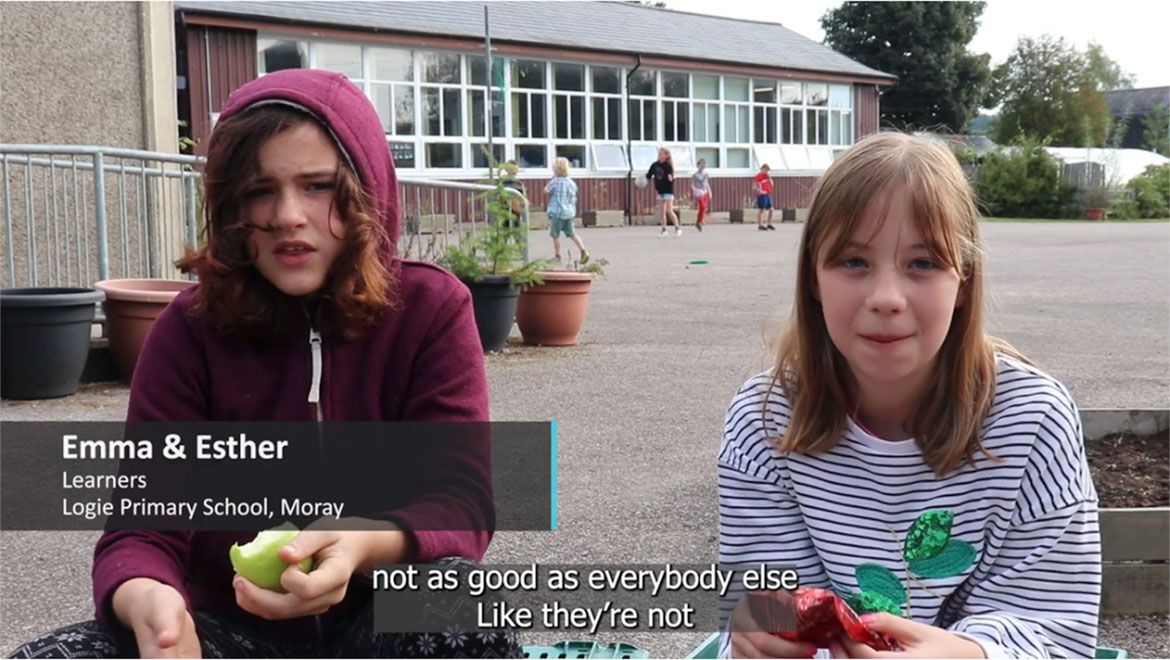
The second in our series of Children’s Rights Conversations events took place on 20 March and focused on child poverty through the lens of children’s rights. UNCRC Project Officer Felicia Szloboda summarises the discussion and conclusions in this blog, and the full video of the event can be accessed here. A new briefing paper has also been published that approaches child poverty from a children’s rights angle and includes some practical examples of taking a human rights-based approach to tackling child poverty.
The event brought together an exceptional panel who shared their views on children’s rights and child poverty in Scotland:
- Bruce Adamson - Children and Young People’s Commissioner for Scotland
- Bill Scott - Chair of the Poverty and Inequality Commission
- Lydia Murphy – Development Officer at the Poverty Alliance, Rights in Action Project.
The first question to our panel members got straight to the heart of the issue: Is freedom from poverty a human right?
Our panel members agreed that freedom from poverty is a fundamental human right. Bill Scott quoted from the Universal Declaration of Human Rights (UDHR) and emphasised that “Everyone has the right to a standard of living adequate for the health and well-being of himself and of his family, including food, clothing, housing and medical care and necessary social services, and the right to security in the event of unemployment, sickness, disability, widowhood, old age or other lack of livelihood in circumstances beyond their control. Motherhood and childhood are entitled to special care and assistance. All children, whether born in or out of wedlock, shall enjoy the same social protection.” He also added that under Article 14 of the UDHR, everyone has the right to seek and to enjoy in other countries asylum from persecution. No child is an illegal child and everyone is entitled to an adequate standard of living.
Despite this universal commitment to the right to an adequate standard of living, research from the Food Foundation found that four million children in the UK went hungry in January. Not having access to nutritious food damages children’s health, and adversely affects their development, educational attainment, life chances and long-term life expectancy. On average, people living in the poorest communities have a life expectancy 14 years shorter than those who live in the most affluent communities. The gap between the poorest and the wealthiest is increasing rather than diminishing. Bill Scott summed up by saying that “poverty is a killer as surely as war and disease; it just takes longer”.
Bruce Adamson reiterated that many human rights instruments are very relevant to children’s rights. The United Nations Convention on the Rights of the Child (UNCRC) is special because it covers a wide range of civil, political, social, economic, and cultural rights and it recognises that states have a special obligation to children and young people. Children and young people don't have the same economic or political power as adults, and they are at a special stage of development. On the thirtieth anniversary of the UNCRC, the Commissioner’s Office asked children and young people why rights were important to them:
“Freedom from poverty helps all children flourish.”
“Rights are help before you even ask.”
Bruce Adamson continued by saying that tackling poverty should not be seen as an act of charity. Living free from poverty is an entitlement and it is the duty of the state to ensure that children do not go hungry and are not poorly clothed or cold. A few years ago, Phillip Alston, former UN Special Rapporteur on extreme poverty and human rights, wrote a scathing report on the state of poverty in the UK and highlighted that allowing poverty to continue is a political choice and a political failure. Poverty can affect every aspect of a child’s life and the impact can last for a lifetime. There are many rights affected by poverty ranging from the right to an adequate standard of living including nutritious food, a safe and warm home and appropriate clothing to the right to social security and the protection of care-experienced and refugee children. The best interest of the child should be the primary consideration when public bodies make decisions including the setting of budgets and any individual decision that has a direct or indirect effect on children and young people. Another important right is Article 12, the right to participate in decision-making and have the views of children and young people taken seriously. This is strongly linked to the state obligation to use all available resources to the maximum extent possible to realise children’s economic, social and cultural rights.
Bruce Adamson concluded by saying that poverty is a right to life issue and it is a massive political failure that a quarter of children in Scotland are affected by poverty. This is happening right now, right here in Scotland and we cannot accept children going hungry and living in unsuitable housing without their basic needs being met. We need to make sure that every level of government addresses poverty as a human rights issue. As a last note on this point, Bruce Adamson shared another quote from a child who felt that poverty robbed them of their childhood:
“The most unfair thing is that governments know that families are going through hard times, but they decide not to do anything about it.”
Later in the event, Bruce Adamson also talked about the importance of children’s rights-based budgeting and carrying out Children's Rights and Wellbeing Impact Assessments and Evaluations when making budgetary decisions. The Commissioner’s Office has worked on a project with East Lothian Council that focused on involving children in Child Rights Impact Assessment (CRIA) and Child Rights Impact Evaluation (CRIE). He also referred to the resources produced by the European Network of Ombudspersons for Children and emphasised the importance of these practical tools to improve children’s lives and enable more efficient and legitimate decision-making.
We also had the opportunity to hear from Lydia Murphy from the Poverty Alliance who talked about their partnership with a Roma youth organisation called Romano Lav. Lydia has recently co-produced a human rights workshop with young people and she talked about the benefits of working with young people. She explained that a key element of co-production is empowerment, and the idea that young people know their rights and are the best people to communicate with their peers. They use accessible language and creative ideas that help to get the message across to other young people in their communities.
Talking about poverty through a human rights lens can also empower people to share their experiences with poverty without stigmatising or re-traumatising them. The panel emphasised the importance of involving people with lived experience in finding solutions because they are the ones who face these challenges on a daily basis. We need to move away from the idea that poverty is about individual choices. Tackling poverty is not an act of charity but an obligation of the government. Bruce Adamson powerfully stated that those experiencing poverty should not be ashamed, but those who are in power and allow poverty to exist in our society should be.
We are keen to organise more events to discuss children’s rights from different perspectives in the future. Check the Improvement Service website for updates on future events and follow the UNCRC team at the IS on Twitter: @beckyporty and @Felicia.Szloboda
If you have any further questions about child poverty and the UNCRC or would like to know more about the support we provide, please contact the Improvement Service directly. There is also a Children’s Rights in Scotland group on the Knowledge Hub, where staff from Local Government, the public and third sectors can share best practices and discuss new developments.
Update: The UNCRC Bill received Royal Assent on 16 January 2024. The provisions of the United Nations Convention on the Rights of the Child (Incorporation) (Scotland) Act 2024 come into force on 16 January.
